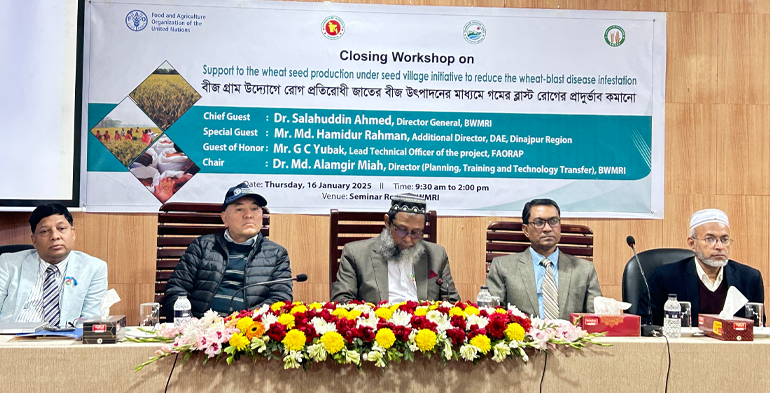
Agrilife24.com:The Food and Agriculture Organization of the United Nations (FAO), in partnership with the Bangladesh Wheat and Maize Research Institute (BWMRI), organized a closing workshop for its pioneering project on developing a wheat blast-free seed system using the "Seed Village" approach on January 16, 2025, at BWMRI in Dinajpur. It marks a significant milestone in the efforts to strengthen seed systems and improve agricultural productivity in Bangladesh.
The project has been implemented through the FAO Technical Cooperation Programme Facility (TCPF), and focuses on producing and disseminating blast-resistant wheat seeds, particularly the BARI Gom 33 and BWMRI Gom 3 varieties. These varieties, developed through collaborative efforts between BWMRI and the International Maize and Wheat Improvement Center (CIMMYT), offer enhanced yield potential and resilience against wheat blast disease, a serious threat to wheat cultivation in Bangladesh.
Dr. Salahuddin Ahmed, Director General, BWMRI and Dr. Yubak Dhoj GC, Senior Agricultural Officer from the FAO Regional Office for Asia and the Pacific (RAP) in Thailand graced the event while Dr. Md. Alamgir Miah, Director (Planning, Training and Technology Transfer), BWMRI chaired the sessions.
Dr. Yubak highlighted the importance of ‘Seed Village Approach’ on production and dissemination of high quality wheat seeds, which is very vital for increasing wheat yield in one hand and for minimizing the use of harmful pesticides on the other hand.
Dr. Salahuddin Ahmed urged for the continuation of FAO’s support to scale up the ‘Seed Village Approach’ across the country for the expansion of quality wheat seed production. He said, ‘the demand for wheat is increasing day by day in the country. Apart from decreasing wheat acreage, the crop is facing various challenges including higher diseases and insect infestation. Availability of quality seed that are resistant to disease such as blast will certainly help increasing wheat production in the country’.
The workshop showcased the project's major achievements, key activities, and the impact it has had on creating a sustainable wheat-blast-free seed system and highlight lessons learned from the "Seed Village" model, a farmer-led initiative that encourages the production, processing, and distribution of quality seeds. Government agencies, agricultural experts, policymakers, and other stakeholders convened to discuss the results of the project and explore ways to scale up the "Seed Village" initiative to benefit a wider audience. The workshop also facilitated
discussions on strategies for sustaining and expanding the project’s successes, including advocating for continued investment by the government and donors to ensure the long-term success of these initiatives.
FAO Bangladesh and BWMRI distributed a newly Resource Handbook developed under the project to attendees which aims to promote high-quality wheat seed production systems and provide useful tools for farmers and extension officers.
The workshop fostered an exchange of knowledge and experiences between farmers, researchers, and extension officers, helping to further improve agricultural practices in Bangladesh.
The Seed Village Approach: A Solution to reduce Bangladesh’s Seed Gap
The availability of high-quality seeds is critical to reducing the productivity gap between research stations and farmer fields. In Bangladesh, while formal government and private sector channels meet only 25% of seed demand, the remaining 75% is fulfilled through informal and semi-formal systems. Small and marginal farmers, who make up 65% of the farming community, are integral to meeting this demand. By strengthening their capacity in seed production, processing, storage, packaging, and marketing, the “Seed Village” concept plays a
vital role in ensuring the availability of quality seeds.
The closing workshop served as an important platform to reflect on the successes of the project and to chart a path forward for the scaling up of the “Seed Village” model. By strengthening local seed systems and empowering farmers with knowledge and resources, the initiative has laid the foundation for a more resilient agricultural sector in Bangladesh.
























